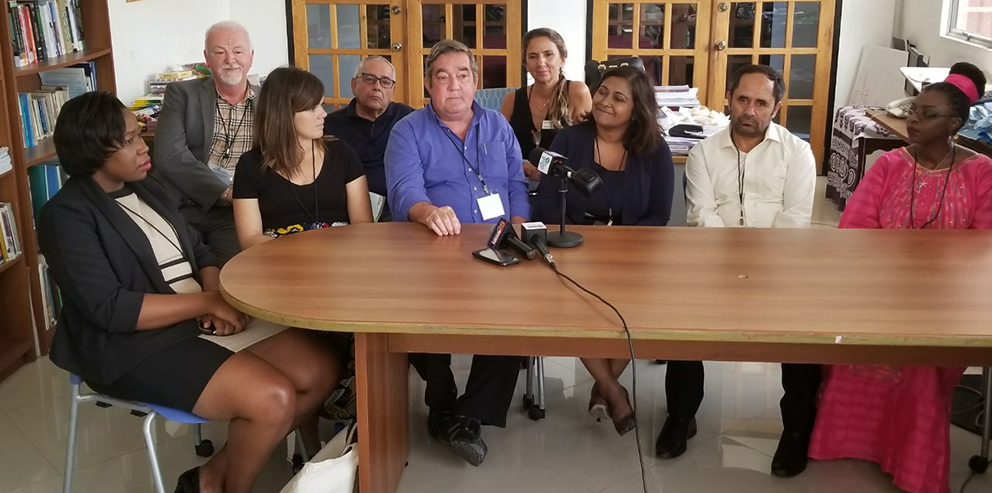The School of the Nations (SON) yesterday launched its Cambridge Certificate in Educational Leadership programme with a Caribbean Conference on Educational Leadership, which was attended by educators from across the country and around the world.
The conference, which ends today, is being hosted with the support of the Ministry of Education and the British High Commission. Dozens of teachers were in attendance as well as regional education administrative staff, the British High Commissioner Greg Quinn, representative of the Cambridge International Examinations Lucila Marquez and Director of National Centre for Education Resource Development (NCERD) Jennifer Cumberbatch.
The event inaugurated what is expected to be a four-month programme, SON’s Director Dr Brian O’Toole related yesterday. The certificate programme will also facilitate idea exchange with teachers from the United States, who through the organisation ‘Limited Resource Teacher Training,’ will be travelling to Guyana for a few weeks to work in the interior.
“This Educational Leadership certificate is actually very locally created with the support and assessment and assurance of Cambridge people behind it…teachers at the end of it will submit or heads at the end of it will submit a portfolio which basically has to have evidence of thinking and change within it and the impact that it has had on their students,” Marquez explained yesterday.
During the opening ceremony, Marquez had said that the aim was to support teachers in developing their thinking and practices to ensure lasting improvements in the quality of the learning experience for their students. She noted that for this “new world order,” there was a need for children to be educated differently as they are being educated for jobs that do not yet exist.
Similar sentiments were expressed by Minister of Education Nicolette Henry in her speech, which was delivered by the head of NCERD in her absence.
“Historically, entrepreneurship has not been encouraged or supported for everyone, but now, we need to educate our nation to be future entrepreneurs for the industries that will emerge from our developing nation,” Cumberbatch read.
The aim of yesterday’s conference, Dr O’Toole told a press briefing following the opening ceremony, is to develop education systems through partnerships in order to overcome issues.
Yesterday’s opening ceremony was also followed by workshops led by invited guests Yassin Sarr, of the Starfish NGO, an organisation in The Gambia; Gordon Naylor, representative of the Nancy Campbell Aca-demy, a sister school of SON located in Canada; Dr Farzin Rahmani, of the UK and Zambia; Aziz Royesh, of the Marafat School for Girls in Afghanistan; Emily Finnegan, of Limited Resource Teacher Training; Keressa Carrington, representative of the Association of Business Executives in the Caribbean; Dr Soma Stout, of One Hundred Healthier Lives, a US organization; and Brian Backer, of EPIC Guyana.
“This is the chance to begin to explore new paradigms in development. So, it’s not just an odd cause…there’s a plan to this and the plan is to offer high quality courses from the best possible universities, the best possible agencies, and to get inspired by these people to realise that if people like Yassin can do it in Gambia, one of the poorest countries in Africa, if Aziz can do it in a war-torn country…,” Dr O’Toole said, before suggesting that with similar efforts, the same strides can be achieved locally.
“Being in the US the perception of Africa was ‘these poor people who need to be saved.’ These developing nations that need people to come in and save them and that hadn’t been my experience—the women that I was around did not need saving, they did not need to be empowered, they were already strong. What they needed were opportunities and chances to show what they could do,” Sarr stated yesterday, further supporting Dr O’Toole’s point.
Sarr related that she works with women and girls from low economic backgrounds to provide them with economic opportunities. The organisation dedicates itself to empowering 100 girls every year.
“We don’t need saving and we don’t need saviours, what we need [are] collaborators and people who will accompany us in our journey and what we need is for them to come when they come as partners to see how we can collaborate and how much they can get from us, not just what they can bring to us,” she said.
The conference also marked the launch of Dr O’Toole’s book, titled “Educational Leadership, A Guyanese Perspective”.
He explained that the book documents his experience in the local education system over the past 40 years, including its challenges.
“…Many of the people who have just spoken were integral in the process of helping us develop programmes in literacy, in child labour, in entrepreneurship, in primary healthcare, and so this book tries to document that experience but not in a celebratory victory way of what a wonderful work we’ve done, it’s actually more looking at the challenges along the way and why is change so difficult. Why does so much international development fail? It’s the corruption of the system and it’s looking at what lessons that we can learn to go ahead so that’s what we’ve tried to do in producing this book,” he stated.






